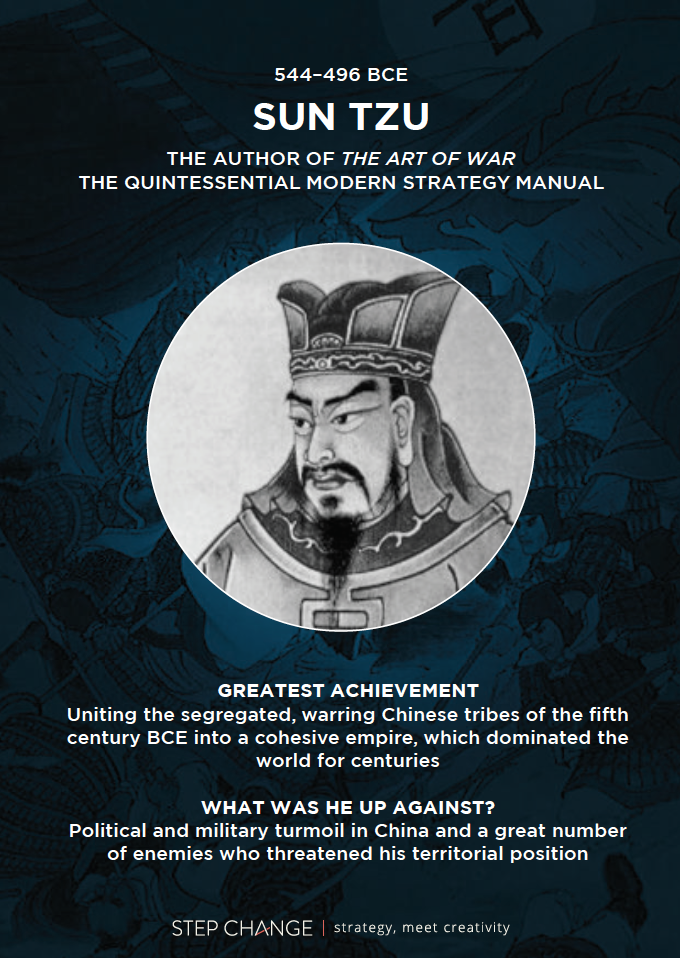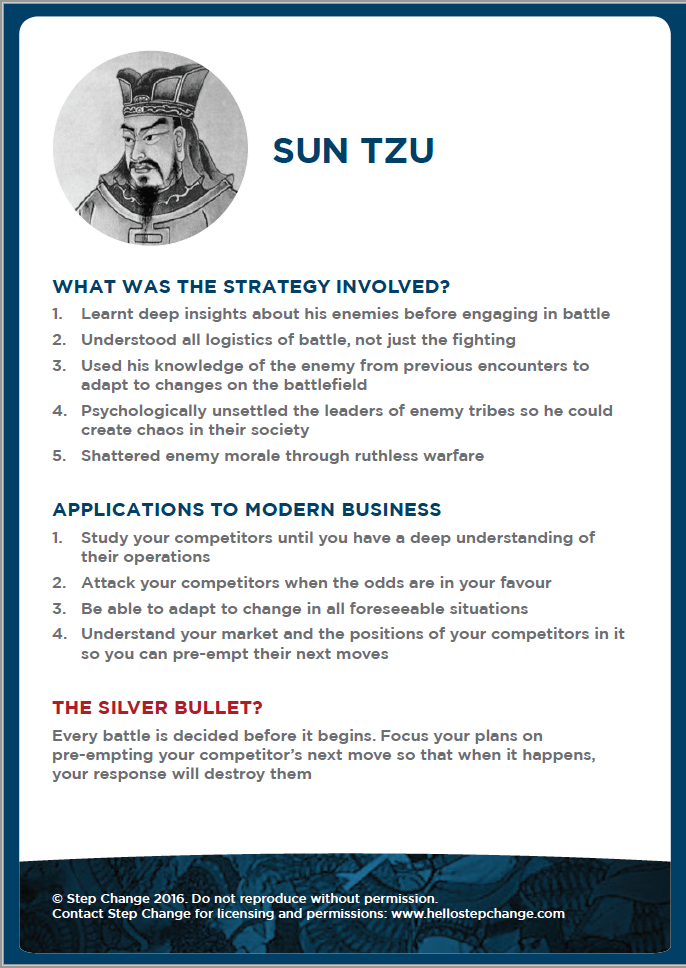The COVID-19 pandemic has changed the lives of a multitude of people. And in the past few months, the world has undergone a number of crisis episodes.
In this series, we use the Step Change creativity tool to show how some of history’s greatest strategists might apply their strategies to the current crisis. The strategist for the day is the great Chinese general, Sun Tzu.
He was a Chinese general, military strategist, and philosopher. He was highly regarded for his sophisticated approach to war. Instead of merely focusing on the combative aspect of war, Sun Tzu understood that what he needed was a more scientific approach to war.
He reviewed past battles, took care of logistics, and studied the psychology of his soldiers and enemies. His book of war was aptly named The Art of War. He approached war as an art form, and his teachings form the basis for many a great general and successful business leader's strategies. The book is widely influential on military strategy.
Great Strategist of the Day: Sun Tzu
 |
 |
His Greatest Triumph: United the segregated, warring Chinese tribes of the fifth century BC into a cohesive empire which dominated the world for centuries.
As a way to look deeper into Sun Tzu’s psyche, we took the time to book a virtual interview with Sun Tzu himself. Here is a short (and imaginary) interview between historian Chris Bishop and the indomitable general Sun Tzu.
Chris Bishop (CB): To start off, with what do you see as your greatest achievement?
Sun Tzu (ST): I feel that uniting the segregated warring tribes of China and moulding them into a cohesive Chinese Empire which I believe will go on to dominate world strategy for centuries.
CB: What has been your major challenge in achieving this?
ST: Dealing with the political and military turmoil which has existed throughout China for many years.
CB: Can you give us a brief overview of your career?
ST: I have had a varied career having spent time in the military rising to the rank of general. I then used my experience to write a book called the Art of War. This book has been widely influential in the military strategy of eastern society, and I believe will eventually be used by all nations in conducting wars. I have not only drawn from my own experience of wars but used strategies drawn from throughout history.
CB: Can you give us some examples of the strategies outlined in the book?
ST: Yes, of course: The following are four key strategies:
- Learn deep insights about your enemy before engaging in battle.
- Understand the logistics of battle, not just the fighting. Supply routes which must support a campaign are critical.
- Build knowledge of previous encounters. In other words, know your enemy. Remember to keep your friends close and your enemies closer.
- Shatter enemy morale by being ruthless. You cannot half dominate an enemy.
There are many other strategies described in the book. I believe the book will be regarded by future generations as the way to manage and win battles.
CB: Can you give us an example of where you have used a particular strategy?
ST: Before hiring me as a general, the King of Wu tested my skills by commanding me to train a harem of 180 concubines into soldiers. I divided them into two companies, appointing the two concubines most favoured by the king as the company commanders.
I ordered the concubines to face right, and they giggled. I declared that the general is responsible for ensuring that soldiers followed orders. I repeated the command, and they still giggled. In response, I ordered their execution.
To the king's protests, I responded. If the general's soldiers understood their commands but did not obey, it was the officers’ fault. Once a general was appointed, it was his duty to carry out his mission, even if the king protested.
After both concubines were killed, I chose new officers to replace them. Afterwards, both companies, now well aware of the costs of further frivolity, performed their manoeuvres flawlessly.
CB: Do you have any last words of wisdom?
ST: I will leave you with two powerful quotes:
“He who knows when he can fight and when he cannot will be victorious.”
“Every battle is decided before it begins. Focus your efforts on pre-empting your enemy's next move.”
Sun Tzu was known for his decisiveness and skill in implementing his strategies. And if he lived during the COVID-19 crisis, there is no doubt he would have handled it well with his trademark strategies.
How Would Sun Tzu Handle the COVID-19 Crisis?
Sun Tzu lived in a time of great unrest and war. He saw thousands die on the battlefield and he experienced the common people’s suffering due to the effects of war. Sun Tzu would have been a great strategist during the COVID-19 crisis. He knew how to think clearly during times of crisis.
Key Strategy #1. He Did His Research on His Enemies
“Know your enemy as you know yourself, and you can fight a hundred battles without disaster.”
As a great strategist, he did his research. He never committed his army to any action unless he knew the weaknesses of his enemy. Once the battle began, he knew how to win.
During the current challenging times, the greatest enemy is uncertainty. Economies are struggling and the future is undecided. The lesson? If your organisation is to survive, you must investigate new ways to gain a competitive advantage.
Key Strategy #2. He Approached War in All Its Facets
“Move swift as the Wind and closely-formed as the Wood. Attack like the Fire and be still as the Mountain.”
Sun Tzu had a very complete and sophisticated approach to war. He knew that it was not just about the strength of arms. He also applied a logistical and psychological approach to war.
He made sure that his men were well provisioned and he studied the behaviour of enemy generals. The lesson is that we should approach our crisis preparations with as much foresight and meticulousness as Sun Tzu.
Key Strategy #3. He Learned From Past Battles
“If you know the enemy and know yourself, you need not fear the result of a hundred battles. If you know yourself but not the enemy, for every victory gained you will also suffer a defeat. If you know neither the enemy nor yourself, you will succumb in every battle.”
Sun Tzu did not become a renowned general by being careless. He was meticulous in all his planning. He learned from past battles. He gathered all the information from old battles, no matter what the outcome.
If you want to be prepared for the COVID-19 crisis, use your mistakes as learning opportunities.
Sun Tzu was one of the greatest military minds in history. He prepared his army for war in all its facets. The lesson here is to plan down to the last detail. There is no rehearsal for you. Get it right. We can all take a feather out of his cap and prepare ourselves during these times of uncertainty.
Featured image credit: Pinterest















